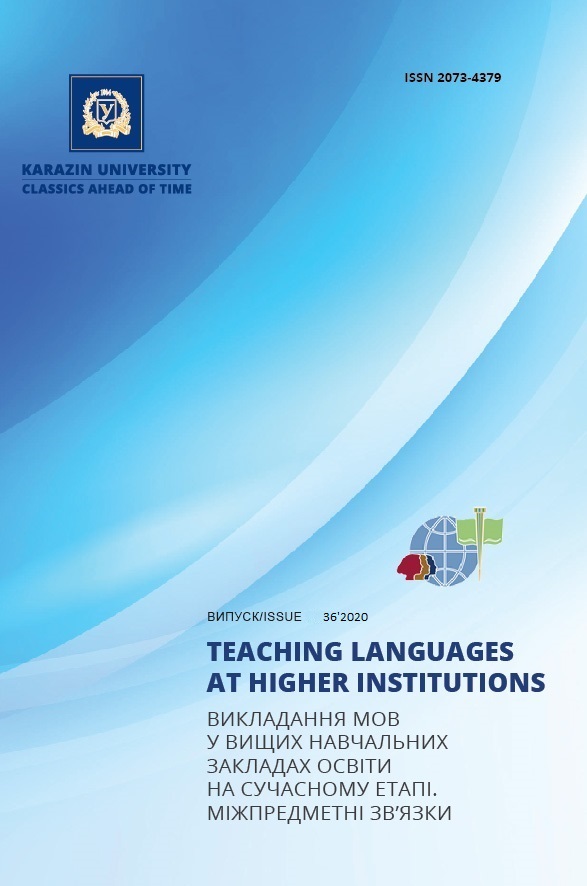Формування м’яких навичок у студентів закладів вищої освіти в контексті навчання іноземних мов
Анотація
У статті розглядається питання формування м’яких навичок у контексті викладання іноземних мов студентам закладів вищої освіти. Аналіз наукових і науково-методичних розробок, присвячених питанню розвитку м’яких навичок студентів вишів, зокрема в процесі навчання іноземних мов, доводить, що, незважаючи на те, що м’які навички мають вирішальне значення для забезпечення працевлаштування, вони все ще недостатньо актуалізовані в системі вищої освіти, що обумовлює нагальну потребу вищих навчальних закладів звернути увагу на названу проблему. У даній публікації пропонується кілька шляхів, здатних сприяти розвитку особистісних і міжособистісних навичок у контексті навчання іноземних мов. Окреслено форми організації навчальної діяльності (індивідуальної, парної, групової), а також методи і вправи (дебати, дискусія, кейс-метод, метод проєктів і т.д.), що мають потенціал озброїти студентів ключовими навичками на основі реальних життєвих сценаріїв і навчального досвіду. Підкреслено, що вправи на розвиток усного мовлення, які, без сумніву, дуже корисні на заняттях з іноземної мови, не є єдино можливими для формування м’яких навичок. М’які навички можуть значно покращитися під час читання та вправ на письмо, тому важливою умовою є органічна інтеграція різних видів діяльності і стратегій навчання. Встановлено, що, перш ніж планувати заняття, викладачі мають усвідомлювати, яким чином формуються м’які навички, обрати, які м’які навички вони хотіли б сформувати в студентів, і підібрати відповідні методи навчання з метою моделювання ситуації, за якої м’які навички можуть бути сформовані максимально природно. Особлива увага в представленій публікації приділяється тому, як та які м’які навички можуть бути розвинені в процесі самооцінювання, взаємооцінювання або оцінювання результатів навчальної діяльності викладачем. Стаття завершується кількома рекомендаціями, що стосуються можливих аспектів перспективних досліджень і проблемних ніш у даній області, які потребують подальшого ретельного вивчення.
Завантаження
Посилання
Abbas, A. (2013). Integrating the English language teaching and learning process with soft skills. International Conference on Education and Language (ICEL). Indonesia: Bandar Lampung University, pp. 356−371 [in English].
Briggs, S. (2015). 30 tips to cultivate soft skills in your students. Open Colleges. InformED: website. Available at: https://www. opencolleges.edu.au/informed/features/30-ways-to-cultivate-soft-skills-in-your-students/ [Accessed 02 Feb. 2020] [in English].
Esmurzaeva, Zh. and Novikova, Y. (2019). Potentsial lingvisticheskih disciplin v agrarnom vuze v razvitii soft skills [The potential of linguistic disciplines in the soft skills development in an agricultural university]. Kontsept [Concept]. V6. Available at: http://e-kon-cept.ru/2019/196053.htm [Accessed 25 Jan. 2020] [in Russian].
Harmer, J. (2002). The practice of English language teaching. Harlow, Essex: Longman [in English].
Haselberger, D. et al. (2012). Mediating Soft Skills at Higher Education Institutions: Guidelines for the design of learning situations supporting soft skills achievement. California: Modes [in English].
Losey, T. (2019). Why learning soft skills and English go hand-in-hand. EF. The Corporate Training Blo: website. Available at: https://www.ef.com/ wwen/blog/corporate/soft-skills-english/ [Accessed 25 Jan. 2020] [in English].
Matyukha, H. and Sokolova, A. (2019). Rozvytok myakyh navychok pry navchanni shkolyariv anhliyskoyi movy [Soft skills development while teaching the English language to school students]. Science, Research, Development. Warszawa: Sp. z o.o. “Diamond trading tour”, Iss. “Pedagogy”, 15, pp. 45−47 [in Ukrainian].
Mosquera, I. (2018). Ideas to bring soft skills into the English classroom. British Council. Teaching English: website. Available at: https://www.teachingenglish.org.uk/blogs/ingrid-mosquera-gende/ideas-bring-soft-skills-english-classroom [Accessed 25 Jan. 2020] [in English].
O’Mahony, J. et al. (2017). Soft Skills for Business Success. Deloitte: Deloitte Access Economics [in English].
Shylova, S. (2017). Formirovanije gibkih navykov sredstvami mikrogruppovykh form raboty pri obucheniji inostrannomu jazyku v vuze [Developing soft skills through group work within the framework of teaching English at university]. Izvestija Saratovskogo univertiteta [Izvestiya of Saratov University]. Saratov: Saratov State University, Ser. Acmeology of Education. Developmental Psychology, Vol. б., Iss. 4 (24), pp. 374–380[in Russian]. DOI: https://doi.org/10.18500/2304-9790-2017-6-4-374-380.
The Importance of Soft Skills. British Council: website. Available at: https:// www.britishcouncil.my/english/courses-adults/learning-tips/importance-of-soft-skills [Accessed 25 Jan. 2020] [in English].

